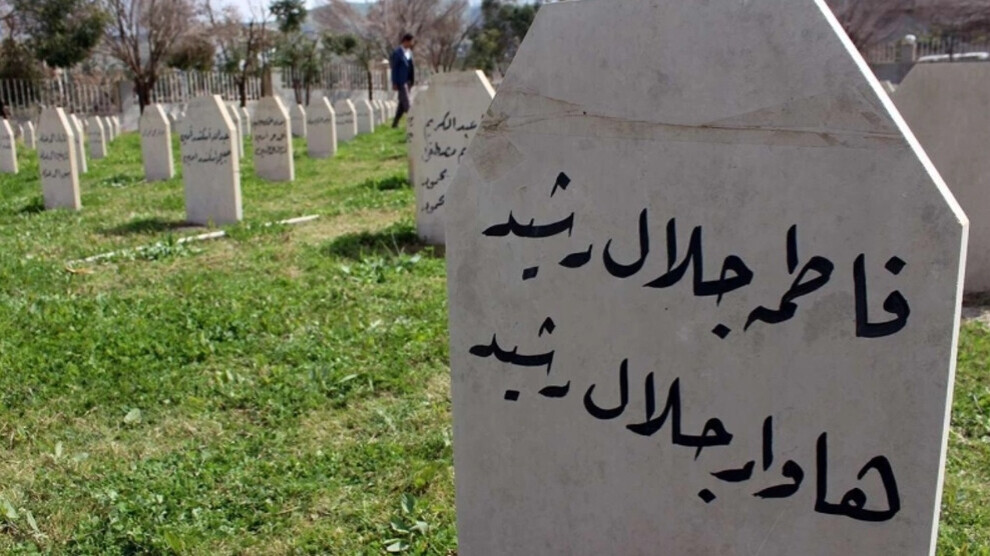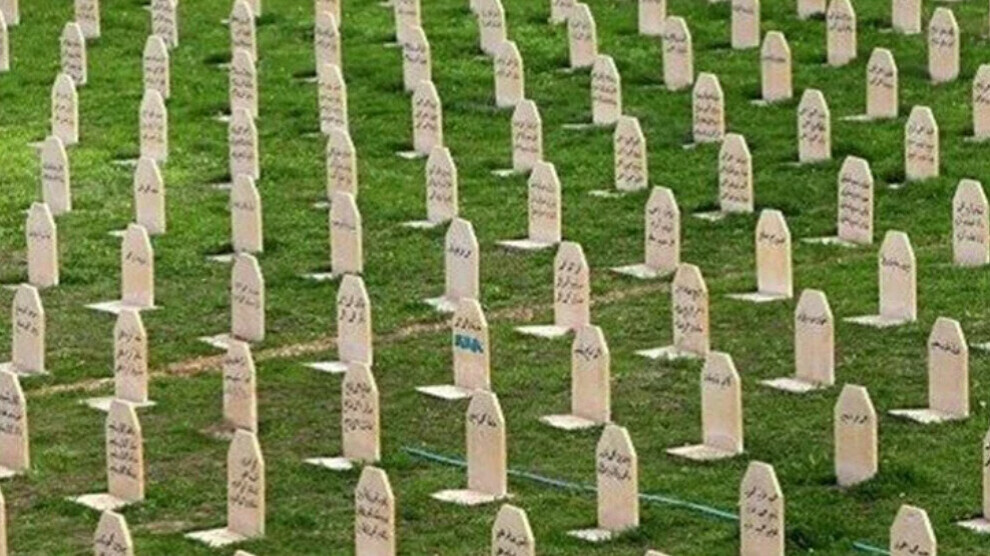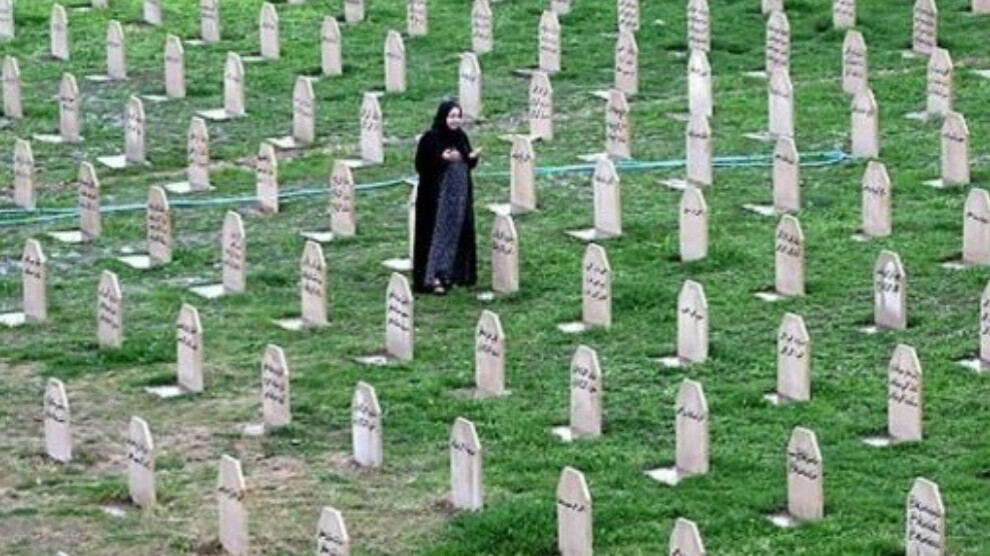Saddam Hussein's regime attack with poison gas on the Kurdish city of Halabja on 16 March 1988 stands as a "reminder to humanity never to close its eyes to the atrocities of war," said KON-MED.

HALABJA MASSACRE
ANF
NEWS DESK
Sunday, 17 March 2024
The poison gas attack on the Kurdish city of Halabja in Iraq in 1988 stands as a "reminder for humanity never to close its eyes to the atrocities of war," said the Kurdish umbrella organization KON-MED in a statement published on the anniversary of the massacre.
Condemning this heinous attack as a war crime and genocide would be an important step towards justice, said KON-MED, adding: "As the umbrella organization of Kurdish cultural associations in Germany, we would like to underline the responsibility of German companies that were involved in Iraq’s chemical weapons program. This responsibility also applies to all victims of the Anfal operation, as part of which the poison gas attack on Halabja was carried out. Under the pretext of counterinsurgency, up to 182,000 people were murdered by the Saddam regime in the course of genocidal measures in the late phase of the First Gulf War."
The statement added: "The memory of the massacre in Halabja must live on, not only as a dark page of history, but also as a warning for the future. We must never forget that war crimes and atrocities against humanity cannot be justified. Our commitment is to ensure that such acts never happen again and that the victims receive appropriate justice and recognition."
KON-MED said that "in recent years there have been repeated reports from Kurdish guerrillas about the use of poison gas by the Turkish state in South Kurdistan (North Iraq), which was directed against these same guerrillas," and demanded that the Organization for the Prohibition of Chemical Weapons (OPCW) "investigate these allegations. We fear for our brothers and sisters in Kurdistan."
36 years ago, the massacre of Halabja
Today marks 36 years since Saddam Hussein massacred thousands of his own people in a chemical attack on the city of Halabja.

HAL
Today marks the 36th anniversary of the chemical attack on the Kurdish town of Halabja in South-Kurdistan. Systematically terrorizing the Kurdish population, Saddam Hussein attempted to silence his critics and at the same time test his chemical and biological weapons.
Saddam Hussein was the first leader in modern times to brutally use chemical weapons against the Kurdish people. Between 1987 and 1988, he had chemical attacks directed towards 40 Kurdish villages, and tested his weapons on thousands of innocent civilians. The worst of these attacks destroyed the town of Halabja in March 1988.
Chemical weapons used in Halabja
The attack was meant to kill as many people as possible. The first barrage shattered protective glass in windows throughout the city, making sure the gas reached its targets.
Saddam’s regime mixed mustard gas and nerve agents to increase the effect of the chemical attacks. Mustard gas attacks the nose, throat and lungs, while Sarin, Tabun and VX attack the eyes and respiratory channels.
One gas had a strong, sweet aroma, like apple blossoms, said survivors, intended to make people inhale deeply to find out what was causing the smell. Another chemical was used as a paralyzing agent, causing people to collapse to the ground.
A third and lethal gas was used because it’s heavier than air. Anyone who fell, or crouched low for safety, or took shelter in a basement. They were dead within minutes.
Men, women, and children died indiscriminately as toxic gas seeped into their homes, through broken windows, filling the spaces where they’d taken shelter.
Chemical weapons also contaminate food and water supplies, soil and wildlife.
Effects of the attack in Halabja
5000 civilians, among them many women, children and elderly, died within hours of the attack. More than 10.000 people were blinded or injured in other ways that destroyed their lives. Thousands of people lost their lives in epidemics or from birth injuries in the following years. Thousands more were forced to leave their homes.
Up to 5,000 people perished that day. Thousands more were injured, most of them civilians.
An old man, a survivor of that day, Abdurrahman Reşit Emin, told ANF that he lost his mother and two siblings in the massacre which he describes as "moments of a grimness that would not end". Emin said that the air was covered with the smell of apples: "We were dumbfounded. The sky in Halabja was shaken with sounds of warplanes, of which there were around 10-15, as I might not remember the exact number. Everything happened so fast. Thousands of people drew their last breath in ten minutes. Dead bodies were lying everywhere one looked. The rest left the city and took the migratory route. Those left to poverty and sickness were as many as the dead. Everyone became miserable. Some lost their minds, some went blind."
KNK: Turkish state plans new massacres like Halabja
The KNK Executive Council, pointing to the plans of the occupying states to carry out new massacres like Halabja, called on all forces not to remain silent in order to prevent massacres and defend the interests of the people of Kurdistan.

HALABJA MASSACRE
ANF
NEWS DESK
Saturday, 16 March 2024
The Kurdistan National Council (KNK) Executive Council condemned in a written statement the 36th anniversary of the genocide perpetrated by Saddam's fascist regime with a chemical weapons attack against the civilian population in Halabja in 1988.
The KNK statement on Saturday said the following:
"On 16 March 1988, thousands of Kurds were massacred, while thousands of others were injured and displaced in a genocidal attack with chemical weapons on the city of Halabja in Southern Kurdistan. The Halabja Massacre was not the first in the history of the Kurdish people and it seems that it will not be the last. Such massacres carry the aim and intention of the brutal occupying states to destroy the Kurdish people so that nothing remains in the name of Kurdishness, so that they do not have a status and identity.
The Halabja Massacre, one of the most painful and brutal massacres in human history, carried out with a racist mentality, showed the whole world how deep the enmity against the Kurdish people is. Thousands of Kurds, women, men, children and the elderly were brutally massacred with chemical weapons. This massacre was carried out in front of the eyes of the world and no state opposed it. The United Nations, the United States, Europe and other countries remained silent in the face of this massacre. They raised their voices against Saddam's fascist and dictatorial regime only when their own interests were threatened.
Today, the same scenario is being repeated by the occupying states. On these days, the anniversary of the Halabja Massacre, the occupying states, especially the Turkish state, the dictator and racist regime of the AKP-MHP, are preparing new plans for massacre and genocide against the Kurdish people and want these plans to be realised. The Iraqi central government, the regional government, are also intended to participate in these plans and the KDP forces are at the center of these plans. These plans are a great threat to the four parts of Kurdistan and to all the interests of the Kurdish people.
For this reason, we call on all forces, parties, political organisations, social institutions, all patriotic and conscientious groups to take a stand against the occupation plans and not to remain silent. Only in this way can we embrace the martyrs of Halabja, prevent massacres like Halabja and defend the interests of the people of Kurdistan.
We commemorate the martyrs of Halabja with all our patriotic feelings and promise that we will fight against the murderer and genocidal enemy by strengthening our duty for our national unity."
No comments:
Post a Comment